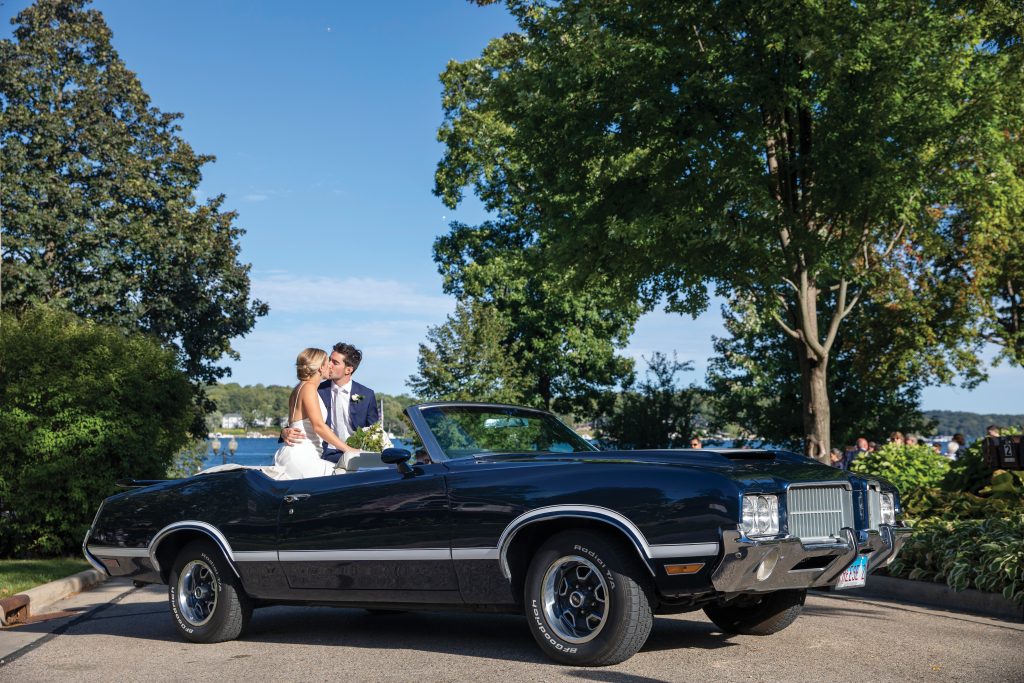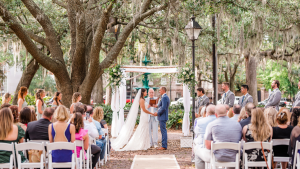What to Consider When Planning a Destination Wedding
By Shelby Deering | Photography by Clay for Lyons Photography
When you first get engaged, there’s excitement, exhilaration and all-around happiness. And if these sound a lot like the emotions that you and your fiancé experience when you travel or take a much-needed vacation, then a destination wedding may be right up your alley.
Destination weddings are a trend that’s still going strong. With pandemic precautions in place and more and more destinations opening up, couples are once again holding their weddings in far-flung locales. In fact, in July 2020, The Washington Post reported that 25% of U.S. couples had a destination wedding, with 40% of them taking place internationally.
But imagine all that goes into planning a big vacation — how will we get there? What hotel should we stay at? What should we budget for?
It also takes careful planning to create the destination wedding of your dreams. Blair Woerfel, owner and lead planner of BW Studio + Events in Chicagoland, is here to share the following tips so your destination wedding goes smoothly and turns out beautifully.
PROS OF DESTINATION WEDDINGS
There are plenty of positives if you’re currently weighing the pros and cons of having a destination wedding. One benefit is that you can treat your guests to a whole new seasonal and visual experience beyond where you live currently, especially if it’s winter where you live and you’re imagining getting married somewhere warm. Living in the Chicagoland area, it’s also an opportunity to get out of the city and opt for an entirely different type of setting, like a gorgeous mountain wedding or a beachside escape. If you live in a rural area, you can hold your destination wedding in a major metropolitan area so you and your guests can experience the lights and action. It’s always wonderful if you give your guests a change of scenery through your wedding, so they feel they are getting away also!
U.S. VS. INTERNATIONAL LOCATIONS
Perhaps, when you picture your destination wedding, it’s nestled within the glistening lights of Paris near the Eiffel Tower, or held on a romantic Jamaican beach. In this case, you’ll need to think through some considerations for an international event.
First of all, there are seasonal hazards to ponder. For your desired destination, is this the rainy season or peak tourist season?
Then there are those extra precautions you’ll need to take for traveling. Your location may require additional vaccines or special paperwork, such as passports or IDs, for guests to attend. You will want to review the COVID-19 vaccination or testing requirements carefully (and monitor them in case of changes).
Will your friends and family members be able to join you in an international location? A wedding in another country may stretch the budgets and travel abilities of your loved ones. If several guests won’t be able to join you at this destination wedding, this location may be better suited for a magical honeymoon getaway.
Lastly, you’ll need to learn about the local marriage laws and requirements. Can you legally get married here? Or will you have to get married at home and just celebrate your ceremony with your guests?
HOW MANY GUESTS?
Like any wedding, your guest count will depend on the type of event you want to host and how easy it will be for everyone to meet you there. For a destination wedding, typically, inviting less than 100 guests is a good amount for it to still feel like a party but also be intimate. Traditionally, couples are looking for a more intimate experience when they choose a destination wedding compared to a local event.
SENDING SAVE-THE-DATES
For international destinations, save- the-date cards should be sent out at least 12 months before the event. If it’s national, nine to 12 months is sufficient, as a lot of guests might already be traveling no matter if it’s at home or somewhere else nationally located. So you will want to finalize your guest list as quickly as possible.
HOTEL BLOCKS
Hotel room blocks are an absolute must when planning a destination wedding. Guests are already coordinating their own travel and other expenses — it’s great to have this decision checked off the list for them. Let them have one or two options that are very near the ceremony and reception (or in some cases, in the same building) — then they don’t have to think too hard about how to find a great hotel in the area.
WHAT TO PAY FOR
If you believe that a destination wedding will be more expensive than a local wedding, think again. In fact, destination wedding budgets span the gamut. The price of your wedding will truly depend on the time of year, your preferred location and any activities you have planned along the way. An intimate beach wedding at an all-inclusive resort can be very cost effective, both for you as well as for your guests, but an elaborate castle wedding in the hills of Germany could easily double that budget.
When budgeting for a destination wedding, the biggest items to budget for after the venue and catering (things that are true of any wedding) include airfare, hotel rooms and transportation.
DRIVING VS. FLYING
When planning a destination wedding, you should think through one basic question for you and your guests: how will we get there?
Flying is always a wonderful way to start your wedding weekend. But keep in mind that flight costs, cancellation policies and schedule changes are always something to be aware of; plus, give yourself plenty of time to arrive on site in case there is a flight delay.
Driving is also advantageous because you can bring special decor items or signage with you instead of shipping them ahead or stuffing them into your carry-on. You won’t have to worry so much about transporting your wedding dress. You’ll also have a more guaranteed arrival time when you drive yourself.
If driving sounds more appealing, one locale to consider for your destination wedding is nearby Lake Geneva. It’ll still feel like a world away from Chicago, and it’s less than a two- hour drive, something that undoubtedly your guests will appreciate.
WELCOME BAGS
Welcome bags or baskets are always a nice way to welcome people to the area and give them ideas for fun things to do locally. You can make recommendations for food, activities and other interesting sights, and share a few little treats to say, “Thank you for making the trip.” Make sure to include local area guides or maps and a schedule of your wedding events.
WEDDING-RELATED EVENTS
Keep in mind that for a destination wedding, you may want to hold a couple of bonus events for your guests who may have traveled far. For instance, you could have a welcome dinner. Or at a minimum, you could have a cocktail hour. It’s an opportunity to say, “Welcome, and thank you for being here” and chat before the busyness sets in. The rehearsal dinner can still be planned as just a special moment for your closest family, friends and wedding party members.
TRANSPORTATION
For the big day, you’ll need to think about how to transport the two of you, your wedding party and your guests from point A to point B.
Frequently, destination weddings are held at all-inclusive locations, which don’t require off-site travel between event locations. But if they aren’t at an all-inclusive location, arranging for transportation options for your wedding party and guests is always an excellent idea. Just like the hotel options, guests are already putting together an extensive travel plan. Removing another item off their research list is extremely helpful. It’s also less likely that they will get lost or go to the wrong site, or, worst case scenario, be late to your ceremony or reception.
YOUR HONEYMOON
Lots of couples stay in the immediate area for their honeymoon, or jet set off to a new location nearby and leave their friends and family to enjoy the local area. It’s up to you whether you want to share your first days as a married couple or have some time for just the two of you.
BLAIR’S TOP TIPS
- Once you set a firm budget, try to stick to it. Nothing is more frustrating than constantly going over budget and turning the planning process into a source of anxiety.
- If you can, check out your venue in advance. Don’t agree to a venue and reception area sight unseen — there are lots of surprises in the international venue market.
- Create a strong wedding website.
- Give your guests as much information as you can and make it easy to update. Hire an amazing planner who has destination wedding experience. Traditional or destination, a wedding planner is always a good idea. It’s less stress for you, and gives you more time to relax and enjoy your destination!
Find the perfect destination venue for your wedding now!





There Are One Thoughts On This Post
Love all the tips here (especially the one about budget) will be back to keep reading all the other posts 🙂 Thanks for sharing!